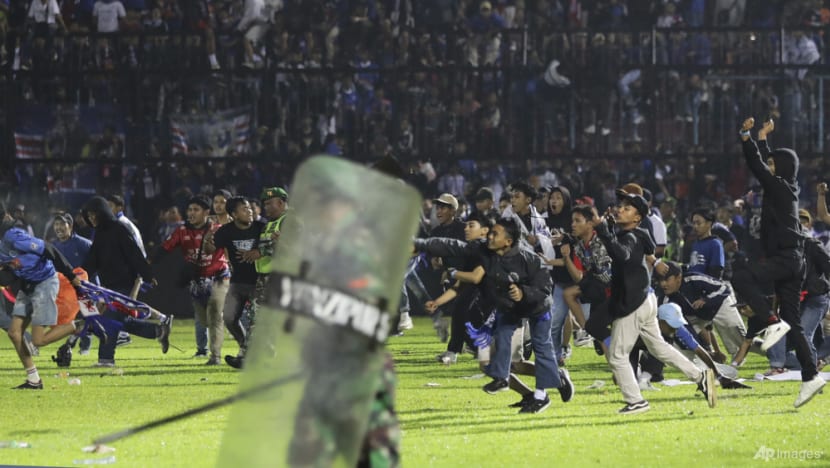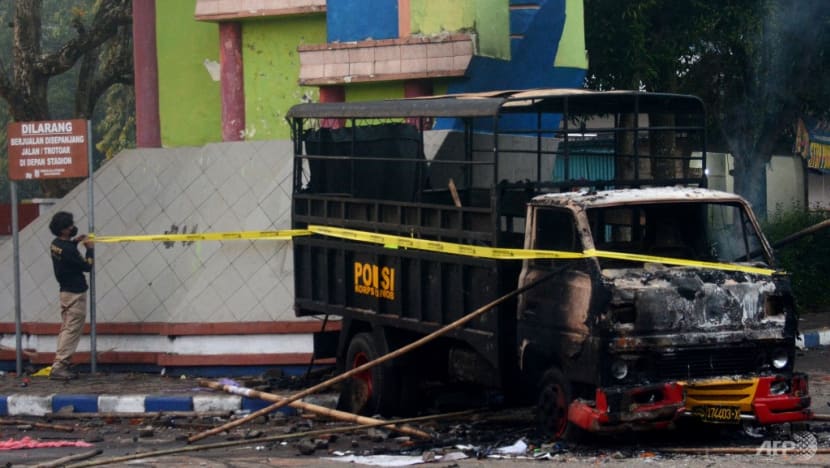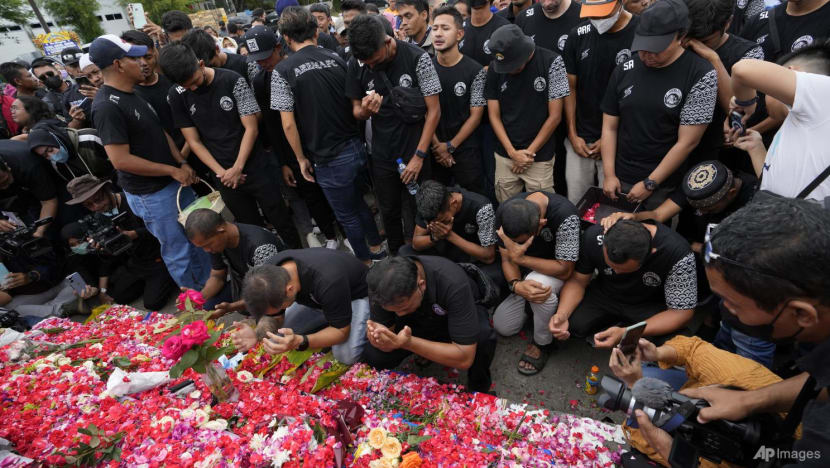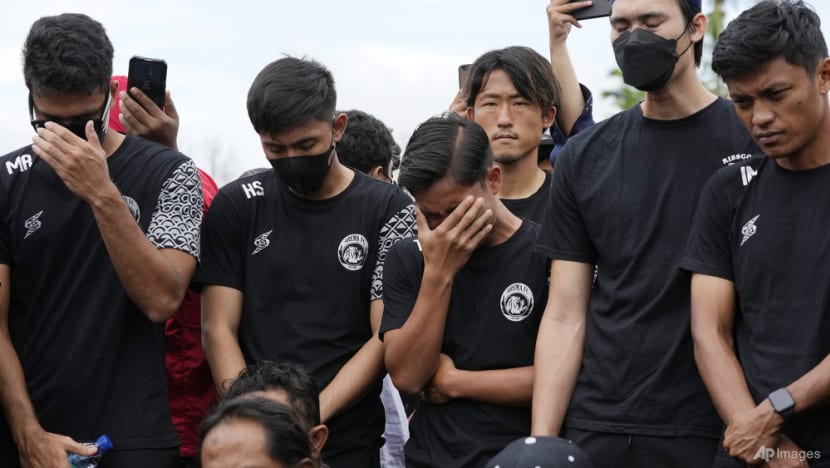Commentary: After deadly stampede, Indonesian football reaches a tipping point
Indonesia is due to host next year’s FIFA men’s Under-23 World Cup and is in the running for the 2023 AFC Asian Cup. Losing the right to stage one tournament and failing to gain the right to host another would damage its reputation, says sports expert Simon Chadwick.

Football fans enter the pitch during a clash between supporters at Kanjuruhan Stadium in Malang, East Java, Indonesia, on Oct 1, 2022. (Photo: AP/Yudha Prabowo)
PARIS: Football is something that unites us as human beings, there are hundreds of millions of people around the world who love to watch, play, and talk about it. Hence, when a tragedy such as that at Indonesia’s Kanjuruhan Stadium occurs, it is not only deeply tragic but also affects anyone who cares about the sport.
Sadly, as much as football unites it also has the capacity to divide, sometimes bitterly and violently so.
Saturday’s events were the outcome of a fierce rivalry between Arema FC and Persebaya Surabaya, although it wasn’t the first time that either football or Indonesia has been embroiled in such a horrific episode.
In 1964, more than 300 people died and 500 were injured at a football match in Lima, Peru. In 2001, 126 people were killed and hundreds injured at a game in Accra, Ghana. Significantly, in both cases, it was the firing of tear gas in response to crowd unrest that became part of a chain of events that ultimately led to so many deaths.
This does not excuse hooliganism or football-related violence. In fact, analyses of all manner of disasters identify that a multitude of factors typically lead to large numbers of casualties, be that at a football match or anywhere else. Indeed, the next step for the Indonesian government will be for it to identify the causes and effects leading up to last weekend’s shocking scenes.
Earlier this year in Paris, events at the UEFA Champions League between Liverpool and Real Madrid showed that deploying chemicals either to regulate crowd flow or to disperse crowds is never a good idea, especially when there are so many people in close proximity.
Though unlike in Paris, certain sections of the crowd in Indonesia clearly went to the match willing to perpetrate violence.



UNDERSTANDING THE FACTORS THAT LED TO THE STAMPEDE
As part of the investigation now unfolding in Indonesia, establishing an understanding of what shapes the motives, attitudes and behaviours of violent fans must be prominent. At the same time, developing a clear understanding of the role that clubs, venues and regulatory authorities played in the incident is important.
What was surprising about Saturday’s game was the number of people who made the decision to enter the field of play.
During the 1970s and 1980s in England, fences were erected to stop hooligans from disrupting matches, though they were later removed and replaced with more robust, more effective, policing and stewarding arrangements.
As one looked on at Saturday’s disturbances, it seemed that whatever such measures may have been in place failed, with horrific consequences. There will also have been a point at which someone – presumably a police officer - pressed the trigger on a gun that fired the first canister of tear gas.
Investigations into the Malang disaster must uncover who made the decision for this to happen, why they made such a decision, and how they envisaged managing the crowd’s response once the smoke began to drift across the stadium.
Behind fans’ distress will have been a chain of decision-making and command that must be uncovered, understood and, ultimately, improved.
FOOTBALL, GOVERNMENT OFFICIALS COMPLICIT
Football and government officials may seek to distance themselves from being culpable, but they are complicit, not least because football hooliganism appears to have become endemic in Indonesia.
As such, though it may be an inconvenient truth for officials who probably see themselves as being part of a solution and not the problem, they are likely to be key stakeholders in the systemic failures that led to so many deaths.
The coming weeks and months are therefore going to be uncomfortable ones for Indonesia’s football community.
Fundamentally, it is morally and ethically incumbent upon those investigating the disaster to determine why people died. After all, nobody should have to attend a football match and fear for their lives or die.
Yet for Indonesia, it is vital that it rapidly gets to grips with what happened and what the country will do to ensure that not only will such an incident never happen again, but also that hooliganism is eradicated completely.
HOOLIGANISM TARNISHES INDONESIA’S FOOTBALL AMBITIONS
The country is due to host next year’s FIFA men’s Under-23 World Cup and is in the running to host the 2023 AFC Asian Cup. These are major tournaments, the hosting of which confer significant reputational, economic and political benefits upon a country.
Losing the right to stage one tournament and failing to gain the right to host another would damage Indonesia, at a time when its international stature is growing.
FIFA particularly will be monitoring developments very carefully. As custodian of the global game, it will not want to be staging a tournament in a country where the threat of hooligan violence is omnipotent.
Violence – or worse than that, fan deaths – would reflect badly upon FIFA, affecting its image, reputation and commercial activities. The latter is especially important for the Switzerland-based governing body, which financially can ill afford to upset sponsors and broadcasters by staging matches that are potentially fraught with menace and aggression.
What took place last weekend should never have happened. Indonesia and its authorities must ensure it never happens again.
Perhaps we are at a tipping point and major changes will be instigated. Perhaps Indonesian football is about to enter a new age, characterised by better organisation and management. Perhaps the country will ascend to a new position in the world of football.
The question is, does the country have the political, economic and social will to make the changes that are necessary?
Simon Chadwick is Professor of Sport and Geopolitical Economy, Skema Business School in Paris.




















